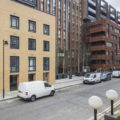
By Sebastian O’Kelly
This is a longer version of an article I wrote for the i Newspaper last week:
Why shared ownership is the most problematic form of housing
The shared ownership leases have come with the usual nasties designed to ramp up the value of the freehold interest, whether to the benefit of housing association or a private company
Taxpayers are subsidising to the tune of billions the creation of shared ownership housing – that is, “affordable housing” of which there are 320,000 units – and the scrutiny of this sector is absolutely woeful.
In part this is because the tenure is so complicated and inconsistently applied, but it is also the case that this suits the housing associations and commercial operators involved just fine. It probably also suits Homes England, too, which is the quango doling out the money to housebuilders, several of whom have an unattractive record of exploiting the opportunities of the leasehold system.
The would-be shared owner is usually a less affluent homebuyer – initially, a key worker – who typically acquires 25% or 50% of a flat from a provider – and then pays rent on the rest. (Or even buys as little as 10% following a rule change: https://www.gov.uk/shared-ownership-scheme#:~:text=When%20you%20buy%20a%20home,the%20maintenance%20of%20communal%20areas )
In the past, housing associations alone offered shared ownership, but these days we see providers of “for profit social housing”, which some may consider akin to atheists proselitizing for god.
Right from the beginning the shared owners are disadvantaged because shared ownership titles are not included on the Land Registry, so there is no way of seeing what are the real prices paid for these properties.
Instead, they are worth whatever the seller decides (taking into account the objective, independent and impartial opinion of a valuer, whose income as it happens would depend on repeat business of this sort).
The shared ownership leases have come with the usual nasties designed to ramp up the value of the freehold interest, whether to the benefit of housing association or private company.
Until the Leasehold Knowledge Partnership, and other campaigners, successfully ended new ground rents with the Leasehold Reform (Ground Rents) Act 2022, the new leases would have had unusually high ground rents, especially in shared ownership retirement flats. These were routinely way in excess of what mortgage lenders would find acceptable: ie maximum of 0.1% of sale price.
In addition, retirement flats can have an exit fee – 2% per year of occupation on the sales price. Unfortunately, these fees have been none too obvious on the sales blurbs.
Invariably, the leases were very short: typically 99 years or 125 years, which meant that they had to be extended as they approached 80 years, at which point leases’ value plummet. This is another extremely lucrative income for the provider. However, now the new model lease is 990 years, which is welcome.
Grisly examples of the problems with shared ownership are stacking up with the Communities Select Committee, headed by Labour veteran Clive Betts, which is at present investigating the sector. This is the all-party body that did such brilliant work with the scandal of leasehold houses and aggressive 10-year doubling ground rents, so its report is likely to be unvarnished.
Shared ownership conveyancing solicitor Zahrah Aullybocus, of Nexa Law, has provided evidence to the committee, referencing a housing association that attempted to introduce five-year doubling ground rents when issuing a deed of variation. That is about as bad as ground rent gaming can get.
She adds that there is no process to value lease extensions with shared ownership – unlike full ownership leasehold – so landlords can charge more or less what they like.
And one client selling a flat faced £750 in various fees from the bodies involved in the management of the shared ownership site.
The leaseholders of the End Our Cladding Scandal campaign have also submitted evidence to the committee, pointing out that there is nothing shared when it comes to the costs and liabilities of shared ownership.
“There is no evidence to suggest that the shared ownership scheme provide good value for money over time,” they write.
“Shared owners trapped in the building safety crisis … have had to face exponential increases in service charges, as well as above-inflation rent increases, cost-of-living crisis costs, and an inability to remortgage, sell, staircase or extend their lease. For the vast majority of lower-to-middle income shared owners this has had severe financial consequences, making them poorer, unable to meet costs and forcing some to sell to cash buyers.”
Distressed sales don’t come much more disadvantageous than for shared ownership.
Most providers have sole rights to sell the property after which the problem in entirety passes to shared owners: they have to sell 100% of the property on the open market, and face the full loss of value that may result.
The EOCS leaseholders want this to be banned, and to force providers to buy back their product. This would have the effect of providers facing the losses that they themselves had introduced into the property market.
But it is the rental portion of shared ownership that has whetted the appetite of those who can see rich pickings in the government’s desperate efforts to ensure that we remain a (partial) property owning democracy.
Here is where the position of the shared owner becomes very vulnerable: if you are in two months arrears on the rent at the time of a court hearing on a possession claim, the court must make a possession order.
This means that it is possible on a £500,000 shared ownership flat in London, where a buyer might have a 25% share, that you could lose the lot on two months’ rent arrears.
Of course, shared owners are going to crawl on hands and knees over broken glass to ensure that they do not lose their homes, even if they only own 25% of it.
This means, of course, that the rental income of shared ownership is a brilliant investment for financial engineers: a legally enforceable income stream lasting 99 years, 125 years, or now 990 years.
In addition, the lease stipulates that the rent can only go up, even if the capital value of the property is going down.
Packaging this income stream up into investment instruments and flogging them off to pension funds and similar has proved irrestable.
It is no exaggeration to say that the rental income from shared ownership is the new ground rent.
Heylo has hoovered up 7,000 shared ownership leases and claims to be the largest investor in UK shared ownership housing. It was founded by ex-barrister Giles Mackay, who set up the influential property analytics company Hometrack, and is funded by the giant US asset manager BlackRock.
Last December it fell foul of the regulator after having “effectively ceded control” of its social housing assets to outside investors, leaving them vulnerable. The regulator identified “significant weaknesses” in Heylo’s governance.
Other eager private investors have piled into shared ownership, often receiving huge dollops of public money to do so: retirement housebuilder McCarthy and Stone (£93.9m) and Vistry / Bovis (£83m) – neither being slouches in the ground rent business – and Sage Housing, part of the Regis Group plc which is controlled by ground rent punters Nicholas and Peter Gould. Sage has funding from the US private equity giant Blackstone.
Perhaps less controversial among leaseholders would be the £125.5m handed to venerable UK institutional investor Legal and General.
Along with the housing associations they appear to have been very active, with an estimated 5.4% of homes for sale in Cambridge offered as shared ownership, with London, Birmingham and, curiously, Plymouth, also have high levels.
The full list of grants 2021-2026 for social housing providers is here https://www.gov.uk/government/news/homes-englands-strategic-partnerships-for-the-affordable-homes-programme-2021-26
Of course, there are many who decry shared ownership, preferring instead a return to the era of mass housing for social rent: council housing, in short.
Shared ownership is an attempt at a market driven alternative.
The intentions behind it are virtuous, and some form of (partial) ownership is probably as good as it is going to get for millions of people priced out of property after 30 years of socially calamitous house price inflation.
But at present this is a murky but fast growing area in the already problematic leasehold sector.
As the veteran housing lawyer Giles Peaker told MPs in March 2020:
“The name shared ownership is probably about as wrong as it possibly could be in crucial respects: its costs are not shared and in very definite effects it is not ownership.
“In effect your security of tenure on a shared ownership lease is considerably less than a standard long lease.”
There needs to be more transparency, data and robust oversight, which is why it is so welcome that Mr Betts and his fellow MPs of the Communities Select Committee are taking a close look.





 Park home owners demo against 10% sales commissions
Park home owners demo against 10% sales commissions






















The “Big Swindle” continues and 320,000 victims (units) of Shared Ownership property’s have been identified so far by LKP, and no doubt that number will increase Daily.
Billions of pounds of Tax Payer Money have been squandered on some ridiculous, ill conceived, badly thought out and poorly implemented assumption, that some how, some day this “idiot scheme” will produce “Affordable Housing” Which In my view is not the case and most resale purchasers would not touch it with a barge pole.
I believe that “Shared Ownership” is far worse than the current Leasehold – Freehold racket, and in all likely hood may have fewer benefits than that of a “Park Homes” Resident.
Government accountability now springs to mind! Who, When, Where and Why signed the dotted line to allow this nonsense to become a reality?
I am a 50% share ownership with longhurst housing association in Lincolnshire. But can you tell me if the government are going to increase the lease. Because I got my house in 1996 with a 99 year lease and now it’s a lot less and hard for me to sell. And I am 72 years old and can’t borrow anymore money to purchase anymore of my house from my housing association. Not even 10%. And now my children have left our family home and gone their own way in life. So my 4 bedroom house is too big for me and my wife. And we have to sleep down stairs because we are disabled pensioners now and on pension credit guarantee.
So if our house gets a longer lease I then have a chance of selling it.
We are a 40% owner with Clarion in Ebbsfleet. My mortgage payment is £545 per month and the rent to Clarion is £695 per month increasing year on year by about £90. The quality of the house is shocking and the communication to get things rectified by Clarion is almost non existent. If we want to change anything (hall way carpet etc…) we have to pay Clarion a consulting fee (£300 non refundable) for a decision that could still bea no